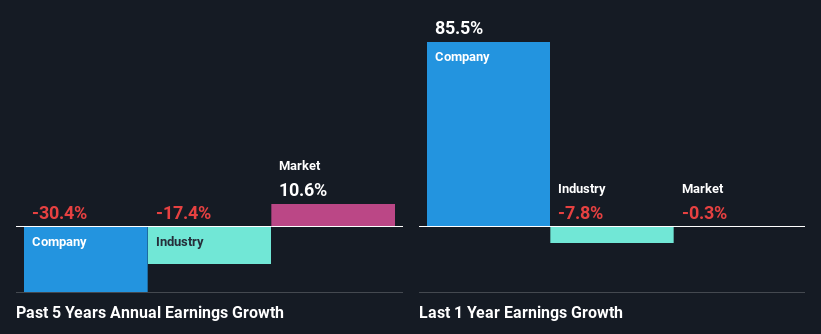Genting Singapore Limited's (SGX:G13) Has Been On A Rise But Financial Prospects Look Weak: Is The Stock Overpriced?
Genting Singapore's (SGX:G13) stock is up by a considerable 16% over the past three months. We, however wanted to have a closer look at its key financial indicators as the markets usually pay for long-term fundamentals, and in this case, they don't look very promising. Particularly, we will be paying attention to Genting Singapore's ROE today.
Return on equity or ROE is an important factor to be considered by a shareholder because it tells them how effectively their capital is being reinvested. In simpler terms, it measures the profitability of a company in relation to shareholder's equity.
View our latest analysis for Genting Singapore
How To Calculate Return On Equity?
The formula for return on equity is:
Return on Equity = Net Profit (from continuing operations) ÷ Shareholders' Equity
So, based on the above formula, the ROE for Genting Singapore is:
4.3% = S$340m ÷ S$8.0b (Based on the trailing twelve months to December 2022).
The 'return' is the income the business earned over the last year. So, this means that for every SGD1 of its shareholder's investments, the company generates a profit of SGD0.04.
What Is The Relationship Between ROE And Earnings Growth?
So far, we've learned that ROE is a measure of a company's profitability. We now need to evaluate how much profit the company reinvests or "retains" for future growth which then gives us an idea about the growth potential of the company. Generally speaking, other things being equal, firms with a high return on equity and profit retention, have a higher growth rate than firms that don’t share these attributes.
Genting Singapore's Earnings Growth And 4.3% ROE
On the face of it, Genting Singapore's ROE is not much to talk about. However, given that the company's ROE is similar to the average industry ROE of 3.9%, we may spare it some thought. But then again, Genting Singapore's five year net income shrunk at a rate of 30%. Remember, the company's ROE is a bit low to begin with. Therefore, the decline in earnings could also be the result of this.
Next, when we compared with the industry, which has shrunk its earnings at a rate of 17% in the same period, we still found Genting Singapore's performance to be quite bleak, because the company has been shrinking its earnings faster than the industry.
The basis for attaching value to a company is, to a great extent, tied to its earnings growth. The investor should try to establish if the expected growth or decline in earnings, whichever the case may be, is priced in. By doing so, they will have an idea if the stock is headed into clear blue waters or if swampy waters await. One good indicator of expected earnings growth is the P/E ratio which determines the price the market is willing to pay for a stock based on its earnings prospects. So, you may want to check if Genting Singapore is trading on a high P/E or a low P/E, relative to its industry.
Is Genting Singapore Making Efficient Use Of Its Profits?
Genting Singapore's very high three-year median payout ratio of 106% over the last three years suggests that the company is paying its shareholders more than what it is earning and this explains the company's shrinking earnings. Paying a dividend beyond their means is usually not viable over the long term.
Moreover, Genting Singapore has been paying dividends for at least ten years or more suggesting that management must have perceived that the shareholders prefer dividends over earnings growth. Upon studying the latest analysts' consensus data, we found that the company's future payout ratio is expected to drop to 66% over the next three years. Accordingly, the expected drop in the payout ratio explains the expected increase in the company's ROE to 8.8%, over the same period.
Conclusion
Overall, we would be extremely cautious before making any decision on Genting Singapore. Particularly, its ROE is a huge disappointment, not to mention its lack of proper reinvestment into the business. As a result its earnings growth has also been quite disappointing. With that said, we studied the latest analyst forecasts and found that while the company has shrunk its earnings in the past, analysts expect its earnings to grow in the future. To know more about the latest analysts predictions for the company, check out this visualization of analyst forecasts for the company.
Have feedback on this article? Concerned about the content? Get in touch with us directly. Alternatively, email editorial-team (at) simplywallst.com.
This article by Simply Wall St is general in nature. We provide commentary based on historical data and analyst forecasts only using an unbiased methodology and our articles are not intended to be financial advice. It does not constitute a recommendation to buy or sell any stock, and does not take account of your objectives, or your financial situation. We aim to bring you long-term focused analysis driven by fundamental data. Note that our analysis may not factor in the latest price-sensitive company announcements or qualitative material. Simply Wall St has no position in any stocks mentioned.
Join A Paid User Research Session
You’ll receive a US$30 Amazon Gift card for 1 hour of your time while helping us build better investing tools for the individual investors like yourself. Sign up here

